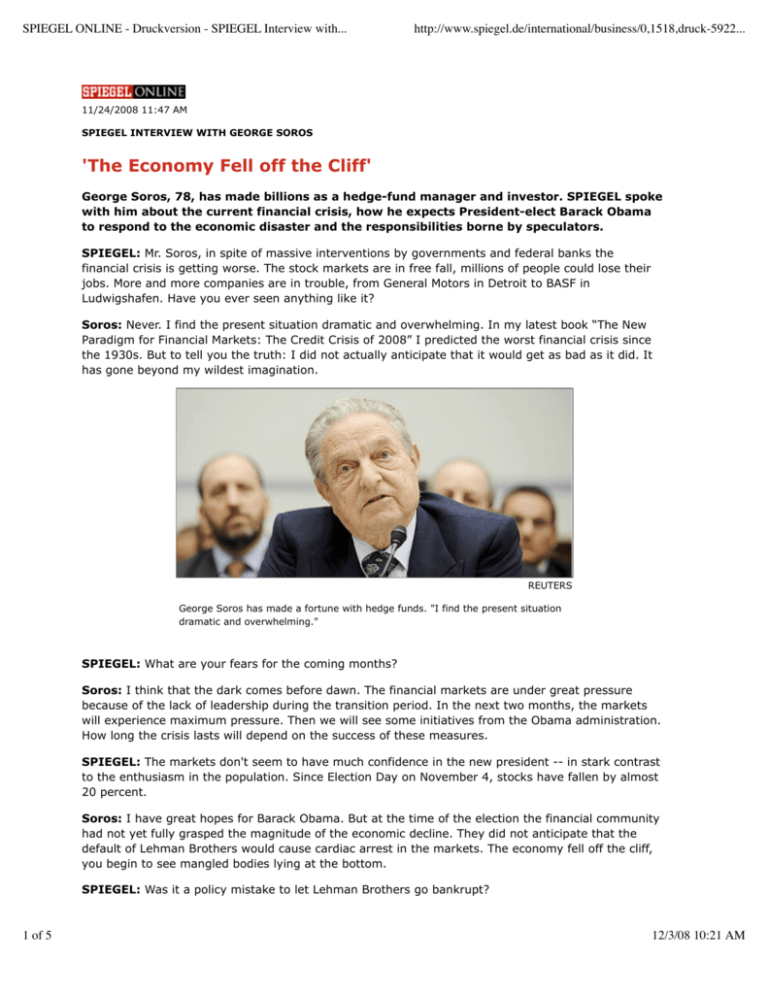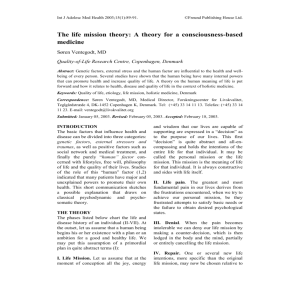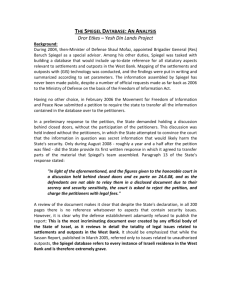
SPIEGEL ONLINE - Druckversion - SPIEGEL Interview with...
http://www.spiegel.de/international/business/0,1518,druck-5922...
11/24/2008 11:47 AM
SPIEGEL INTERVIEW WITH GEORGE SOROS
'The Economy Fell off the Cliff'
George Soros, 78, has made billions as a hedge-fund manager and investor. SPIEGEL spoke
with him about the current financial crisis, how he expects President-elect Barack Obama
to respond to the economic disaster and the responsibilities borne by speculators.
SPIEGEL: Mr. Soros, in spite of massive interventions by governments and federal banks the
financial crisis is getting worse. The stock markets are in free fall, millions of people could lose their
jobs. More and more companies are in trouble, from General Motors in Detroit to BASF in
Ludwigshafen. Have you ever seen anything like it?
Soros: Never. I find the present situation dramatic and overwhelming. In my latest book “The New
Paradigm for Financial Markets: The Credit Crisis of 2008” I predicted the worst financial crisis since
the 1930s. But to tell you the truth: I did not actually anticipate that it would get as bad as it did. It
has gone beyond my wildest imagination.
REUTERS
George Soros has made a fortune with hedge funds. "I find the present situation
dramatic and overwhelming."
SPIEGEL: What are your fears for the coming months?
Soros: I think that the dark comes before dawn. The financial markets are under great pressure
because of the lack of leadership during the transition period. In the next two months, the markets
will experience maximum pressure. Then we will see some initiatives from the Obama administration.
How long the crisis lasts will depend on the success of these measures.
SPIEGEL: The markets don't seem to have much confidence in the new president -- in stark contrast
to the enthusiasm in the population. Since Election Day on November 4, stocks have fallen by almost
20 percent.
Soros: I have great hopes for Barack Obama. But at the time of the election the financial community
had not yet fully grasped the magnitude of the economic decline. They did not anticipate that the
default of Lehman Brothers would cause cardiac arrest in the markets. The economy fell off the cliff,
you begin to see mangled bodies lying at the bottom.
SPIEGEL: Was it a policy mistake to let Lehman Brothers go bankrupt?
1 of 5
12/3/08 10:21 AM
SPIEGEL ONLINE - Druckversion - SPIEGEL Interview with...
http://www.spiegel.de/international/business/0,1518,druck-5922...
Soros: It was a fatal mistake. I would have never expected that the authorities let such a big
investment bank go.
SPIEGEL: Will there be more victims?
Soros: Possibly. CitiBank, one of the world’s largest banks, is currently at the center of attention
( eds. note: The $300 billion US government plan to stabilize CitiBank had not been approved by the
time of this interview). There are some other bodies lined up for potential trouble. The situation is
very similar to the 1930s -- but it is going to unfold differently. We have learned not to allow the
financial market to collapse. We will spend all the money in the world to prevent that from
happening.
SPIEGEL: Obama is supposed to save the banks, bail out the auto industry and boost the economy
in general. Can a single person ever live up to such high expectations?
Soros: Perhaps not, but the problems can be handled much better than they have been by the
current administration.
SPIEGEL: Currently, Treasury Secretary Henry Paulson is in charge of the bail-out. What are your
misgivings about his performance?
Soros: He reacted to problems as they arose; he had no capacity to anticipate them. When he
allowed Lehman Brothers to fail, the breakdown of the financial markets found him totally
unprepared. He went to Congress not with a plan but with a plan to develop a plan. And the plan he
had in mind -- to purchase toxic assets -- was ill-conceived. Injecting equity capital into the banking
system made much more sense and he eventually came to see that, but again he went about it in the
wrong way. Then he stopped doing anything, leaving a vacuum in leadership, and the markets
collapsed.
SPIEGEL: What are your expectations for the next Secretary of the Treasury?
Soros: I think we need a large stimulus package which will provide funds for state and local
government to maintain their budgets -- because they are not allowed by the constitution to run a
deficit. For such a program to be successful, the federal government would need to provide hundreds
of billions of dollars. In addition, another infrastructure program is necessary. In total, the cost would
be in the 300 to 600 billion dollar range.
SPIEGEL: In addition to the $700 billion bailout for the financial industry?
DPA
Financial manager George Soros worries about a leadership vacuum during the
transition from President George W. Bush to President-elect Barack Obama.
2 of 5
12/3/08 10:21 AM
SPIEGEL ONLINE - Druckversion - SPIEGEL Interview with...
http://www.spiegel.de/international/business/0,1518,druck-5922...
Soros: Definitely. I think this is a great opportunity to finally deal with global warming and energy
dependence. The US needs a cap and trade system with auctioning of licenses for emissions rights. I
would use the revenues from these auctions to launch a new, environmentally friendly energy policy.
That would be yet another federal program that could help us to overcome the current stagnation.
SPIEGEL: Your proposal would be dismissed on Wall Street as "big government." Republicans might
call it European-style "socialism."
Soros: That is exactly what we need now. I am against market fundamentalism. I think this
propaganda that government involvement is always bad has been very successful -- but also very
harmful to our society.
SPIEGEL: Would you advise the new president to say that publicly?
Soros: He has already spoken about changing the political discourse. I think it is better to have a
government that wants to provide good government than a government that doesn't believe in
government.
SPIEGEL: However, even a strong government can't perform miracles. It needs money from the
taxpayers. There is a lot of talk in the US about the new role of the state and the government -- but
no one seems to be willing to pay for it. Obama has announced to cut taxes for 95 percent of working
Americans. Isn't that a contradiction?
"I Always Play by the Rules"
Soros: At times of recession, running a budget deficit is highly desirable. Once the economy begins
to recover, you have to balance the budget. In 2010, the Bush tax cuts will expire and we should not
extend them. But we will also need additional revenues. Should the government not receive them, we
will all get punished with higher interest rates.
SPIEGEL: Everybody says we have to regulate the financial markets more. That sounds good, but is
it realistic? Can one really tame the markets?
Soros: Between regulators and market participants, there is a cat and mouse game going on which
has been going on indefinitely…
SPIEGEL: …where often the mice, the market participants, have the upper hand.
Soros: Because they got the extra boost from market fundamentalists. But the outcome was
disastrous, as we see now. I think it is better to have a cat and mouse game where the cat has the
upper hand than a cat and mouse game where the mice are ruling. Because the latter means that the
market participants are given free range. That was actually the big misconception of our national
hero Ronald Reagan, who always talked about the magic of the market.
SPIEGEL: So you support stricter regulation and more efficient control of the markets?
Soros: Indeed. However, you have to recognize that regulations will never be completely successful
and they will always be full of holes. You must constantly be ready to fill new holes. Actually
regulation should be kept to a minimum, but there has to be some cooperation between market
participants and authorities -- as was the case in the early postwar years. The Bank of England was a
very successful regulator by cooperating with market participants. This cooperative spirit was broken
by the market fundamentalists.
SPIEGEL: Not in Germany. We have many semi-private banks that largely dominate the market.
Politicians serve on their supervisory boards. But they are in particularly bad shape.
Soros: These public-private partnerships are very, very dangerous. The most rotten part of the
financial system in the US consisted of the government sponsored entities, Fannie Mae and Freddie
3 of 5
12/3/08 10:21 AM
SPIEGEL ONLINE - Druckversion - SPIEGEL Interview with...
http://www.spiegel.de/international/business/0,1518,druck-5922...
Mac. They really kicked off this crisis. The state should set the rules and enforce them -- but not
become involved as a market player.
SPIEGEL: You are one of the most powerful speculators in the world and have been heavily involved
in your fund's activities over the past few months. How do you cope with the dilemma of being a
speculator -- who often profits from a business transaction that might hurt society?
Soros: This is a false issue. I always play by the rules. At the same time, I try to improve the rules.
In so doing I often suggest changes from which I would not personally benefit. I have the common
interest at heart, not my personal interest.
SPIEGEL: But the perception many people have of you and your colleagues is very different. They
blame speculators for the current financial crisis -- is that the reason for your decision to give billions
of dollars to charity and your foundation?
Soros: People think I am giving money because I have pangs of conscience.
SPIEGEL: Isn't there some truth to it?
Soros: No. It is a total misconception. The big events in which I participated would have occurred
whether I took part in them or not. For example, whether I had been born or not, the British pound
would have been forced out of the European Exchange Rate Mechanism in 1992.
SPIEGEL: But are you really such a little wheel as you claim? If you bet against grain, rice or oil,
many other investors follow suit. That could hurt consumers who can no longer afford essential
foodstuffs or energy. You can definitely influence markets.
Soros: Since I became a public figure, the man who allegedly "broke the Bank of England,” I have
been cast as a financial guru who can influence markets. That has actually created more moral
problems for me. It has forced me to impose certain self-constraints in my statements -- exactly
because I can move markets, like the investor Warren Buffett. Therefore, we try to act very
responsibly.
SPIEGEL: Does the world need hedge funds?
Soros: I think that hedge funds are a very efficient way of managing money. But I clearly see the
risks. Hedge funds use credit and credit is a source of instability. My conclusion is that transactions
involving credit should be regulated.
SPIEGEL: Now you sound like a person who runs to a police station and tells the officers: "Please,
handcuff me -- I am dangerous!"
Soros: Not really. I think there needs to be appropriate regulation of the financial markets, but it is
impossible to prevent speculation. There is very little difference between speculation and investment.
The only difference is basically that investments are successful speculations because if you
successfully anticipate the future you make a speculative profit. I don't have a bad conscience at all. I
am very proud to be a successful speculator.
SPIEGEL: Average citizens are not much impressed. They no longer trust Wall Street.
Soros: That mistrust is well placed. Those very prestigious institutions on Wall Street pursue their
self-interest, and that is not identical to the common interest -- which needs to be protected.
SPIEGEL: Many people also no longer have confidence in the bailout measures taken by the Bush
administration. Some critics claim that Treasury Secretary Henry Paulson is simply trying to bail out
his former colleagues on Wall Street. Paulson was once the CEO of Goldman Sachs.
Soros: That may be going too far. But it is true that Paulson sees the problems too much from the
perspective of a Wall Street banker.
4 of 5
12/3/08 10:21 AM
SPIEGEL ONLINE - Druckversion - SPIEGEL Interview with...
http://www.spiegel.de/international/business/0,1518,druck-5922...
SPIEGEL: He is also reluctant to push for salary caps for CEOs or bonus restrictions at banks
receiving government aid.
Soros: Giving government aid to a bank basically transforms it into a utility. The huge salaries in this
sector are only a symptom of a more profound misalignment. The profitability of the finance industry
has been excessive. For a while, 35 percent of all corporate profits in the UK and the US came from
the financial sector. That was absurd.
SPIEGEL: We talked a lot about the losers of the current financial disaster. Do you also see winners?
Soros: China could easily emerge as the great winner if the Chinese leaders handle the situation
well. On the other hand, they could also turn out to be the biggest losers if they handle it poorly. If
the management turns out be wrong, this could lead to a political crisis in China. It's still too early to
declare winners and losers.
SPIEGEL: Could Obama be the first "post-American president" -- because his country loses economic
force and "soft power"?
Soros: If Obama is wise, he will find common ground with China to solve this crisis. If he wants to do
it alone, we will go into a worldwide depression because America is not in a position by itself to clean
up the mess it created.
SPIEGEL: Mr. Soros, thank you very much for this conversation.
Interview conducted by Mathias Müller von Blumencron, Gregor Peter Schmitz and Gabor Steingart
URL:
http://www.spiegel.de/international/business/0,1518,592268,00.html
RELATED SPIEGEL ONLINE LINKS:
FHA-Backed Loans: The Next Subprime Crisis Looms (11/20/2008)
http://www.spiegel.de/international/business/0,1518,591613,00.html
Interview with Bayer CEO Werner Wenning: 'The Pursuit of Profit Is an
Innate Human Trait' (11/19/2008)
http://www.spiegel.de/international/business/0,1518,591282,00.html
West Wing: The Speech We Should Have Heard at the G-20 (11/18/2008)
http://www.spiegel.de/international/germany/0,1518,591104,00.html
© SPIEGEL ONLINE 2008
All Rights Reserved
Reproduction only allowed with the permission of SPIEGELnet GmbH
5 of 5
12/3/08 10:21 AM






